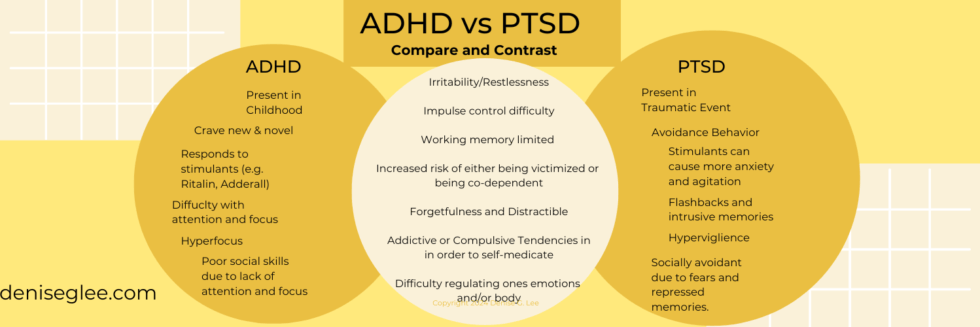
ADHD or Something Else? The Hidden Signs of Misdiagnosis
- Updated: December 4, 2024
As a healing and leadership coach who focuses on helping people with traumas and addictions, I love discussing things that affect how we connect with others and ourselves. One significant challenge that often keeps people from being fully engaged is Attention-Deficit/Hyperactivity Disorder (ADHD).
While we sometimes try to make light of it, for example, with jokes like this:
“Why did the person with ADHD become a detective?
Because they were really good at finding things, especially their keys, wallet, and phone… multiple times a day!”
However, ADHD is not a joking matter. It hurts our productivity and can diminish the quality of relationships. Moreover, it is easy to find low-hanging fruit or correlations to this diagnosis. This is my response to the article,“Distracted, Forgetful, and Hooked on Smartphones: Why More Women Are Being Diagnosed With ADHD” by Julie Jargon.
This article will explore how our minds can change after going through tough experiences, especially trauma. We’ll mainly look into PTSD and see how it can be similar to ADHD. But before that, let’s talk about who typically has ADHD and what ADHD symptoms they might have.
The problem with getting the wrong diagnosis is that the treatments might not be helpful. It's like getting medicine for a cold when you actually have allergies—it won't make you feel better. So, when people are given the wrong treatment, it doesn't fix the real problem, and they might not get the support they really need.
Denise G. Lee Tweet
Who has ADHD?
As of 2024, it’s estimated that around 6.1 million children in the United States (approximately 9.4% of this age group) have been diagnosed with ADHD. In terms of adults, the prevalence is approximately 4.4% (about 10 million adults) who meet the criteria for ADHD. This information comes from the National Institute of Mental Health.
ADHD is real, but not for everyone who have ADHD-related symptoms
Just to be clear, some folks have imbalances in their chemicals that make it tough for them to control themselves and remember things. I’m not talking about them. What I mean is, some people act in ways that look like how others respond to trauma.
Common ADHD symptoms
ADHD symptoms can vary from person to person, and someone might not have all of them. It’s important to remember that having these traits occasionally doesn’t mean you have ADHD. To be diagnosed, the symptoms need to be consistent, severe, and interfere with daily life. That being said, here are common symptoms:
- Difficulty Paying Attention: It can be hard for someone with ADHD to focus on tasks, follow instructions, or complete assignments.
- Hyperactivity: Some people with ADHD may be very energetic, fidgety, or have trouble staying still.
- Impulsivity: Acting without thinking is common in ADHD. This can lead to saying or doing things without considering the consequences.
Why is ADHD misdiagnosed?
It’s surprising how often individuals are misdiagnosed with ADHD when, in reality, they might be dealing with underlying issues such as Post-Traumatic Stress Disorder (PTSD), Generalized Anxiety Disorder, or Obsessive-Compulsive Disorder.

This mix-up happens for a few reasons. First, ADHD and these other issues can have some similar signs, making it tricky to tell them apart. Also, not everyone knows a lot about these things, and sometimes, doctors or therapists might think it’s ADHD when it’s really something else.
A bad mental health diagnosis makes emotional problems worse.
The problem with getting the wrong diagnosis is that the treatments might not be helpful. It’s like getting medicine for a cold when you actually have allergies—it won’t make you feel better. So, when people are given the wrong treatment, it doesn’t fix the real problem, and they might not get the support they really need.
In the next part, we’ll look at some signs that might show it’s more about dealing with tough experiences (like trauma) than having ADHD. This time, we’re going to focus on PTSD and ADHD, but there are other issues too that can be confused.
Early childhood traumas can impact a person in multiple areas: Ability to control your body when it is under/over aroused. Make you sensitive to stimuli such as light and sounds. Decrease your cognitive abilities. All of these can mimic common ADHD symptoms.
Denise G. Lee Tweet
Is it ADHD, or is it a Misdiagnosis?
ADHD vs. PTSD: A Comparison
I’ve come across insightful books such as “When the Body Says No” by Dr. Gabor Maté, “The Body Keeps Score” by Bessel van der Kolk, and “Dopamine Nation” by Anna Lembke, all of which shed light on how our chemistry can become dependent on overstimulation as a coping mechanism to avoid distressing memories and experiences. That being said, let’s discuss some signs that indicate you may have PTSD due to early traumatic childhood experiences.
Signs of Early Childhood Trauma
- Did you grow up with either an absentee/neglectful or abusive/controlling parent or parent-figure?
- Were there ANY types of addiction issues? It doesn’t even have to involve substances; it can be codependency (addiction to people pleasing) or even work addiction.
- Were you raised to either have really high standards or no standards at all?
Signs your ADHD symptoms might actually be PTSD symptoms due to childhood traum
Too many of us are literally walking on emotional eggshells. It just takes one thing or a series of little things that cause us to lose focus on everything, including ourselves. Here are signs, as an adult, that you may have PTSD:
- Inability to control your body when it is under/over aroused.
- Sensitivity to stimuli such as light and sounds.
- Difficulty remembering things.
One of the most common misdiagnoses of ADHD is distractibility. If you have experienced acute stress and/or chronic stress over the course of your life, you may be suffering from dissociation. In the next section, we will discuss it in further detail.
PTSD Symptons & Dissociation
Have you ever lost track, not just of time, but of yourself or what you are doing? This is called dissociation.

Dissociation is like your mind playing tricks on you, making it seem like you’re easily distracted. And yes, distraction is a common ADHD symptom. However, if you have been through a lot of tough and stressful times, you might be dealing with dissociation.
Dissociation can show up in different ways, and it’s not the same for everyone. It’s a kind of mental defense mechanism where your thoughts, who you are, what you’re aware of, and your memories get disconnected. Here are some signs that might mean someone is experiencing dissociation:
Common Signs of Dissociation:
Memory Gaps: Forgetting parts of what happened, especially during tough times. It’s like missing details or whole chunks of time.
Emotional Numbness: Feeling like your emotions are turned down or far away. It’s like not reacting much to things that would usually make you feel something.
Identity Confusion: Not feeling like you know who you are or feeling like you’re watching your own life from the outside.
Altered Perception of Time: Losing track of time or feeling like time is moving really slow or really fast.
Depersonalization: Feeling like you’re not really in your own body, like you’re watching yourself from the outside.
Derealization: Seeing the world around you as weird or not real.
Difficulty Concentrating: Having a hard time focusing on things because your mind is busy with dissociation or intrusive thoughts.
Amnesia: Forgetfulness that goes beyond what’s normal, especially when it comes to tough memories.
Sudden Behavioral Changes: Doing things that are not like you, and then not remembering much about them later.
Flashbacks: Reliving tough experiences through strong and intrusive memories, often triggered by certain things.
Remember, dissociation can happen in different ways and strengths, from just a little bit to more serious and long-lasting experiences.
If you have repressed, suppressed, or are in denial about distressing events or moments in your past, it is easy to quickly label it as just having a hard time focusing. Also, if the doctor or therapist doesn’t ask any trauma-related questions, or the client doesn’t answer truthfully, it can result in a misdiagnosis.
Why Stimulants Don’t Help Trauma Survivors
Whether or not your brain has a chemical imbalance, it’s not a good idea to rely on stimulants like Adderall and Ritalin for a long time. These drugs might make you feel good for a little while because they boost serotonin, but there can be problems afterward. They stop the reabsorption of serotonin in the brain, and this could mess up how your mood is regulated over time.

When people keep using drugs, the brain’s natural way of handling stress gets messed up because of low serotonin levels. It’s like a careful balance, and depending too much on these stimulants for a long time has serious consequences. I talk more about this issue in this article.
Can a Technology Fast Help with Distractibility?

About tech fasts or limits: Removing phones, setting limits, and taking electronic breaks cannot solve the underlying issues of why they have come to use the phone as an emotional crutch. It’s not about having a schedule, seeing what’s “on,” or staying organized. It is a way to avoid the inner chaos that is happening inside their head.
And those voices keep getting louder every time you try to find ways to seek more control through more information via your technology. On top of that, you are getting constant hits of dopamine each and every time you check their notifications. It is a false sense of security and power.
Healing is available to you and anyone else who suffers from ADHD, and it doesn’t have to require technology fasts or taking mind-altering drugs. In the next section, I will talk about how to get back your attention using a natural approach.
Healing from Compulsive and Distracted Behavior: A Holistic Approach
Healing from compulsive and distracted behavior isn’t just about managing your symptoms—it’s about understanding the root causes and finding deeper solutions. Technology, while helpful, can often make things worse by providing constant distractions and a false sense of control. To truly heal, it’s important to slow down and reconnect with yourself. That’s where practices like mindfulness come in. By focusing on the present moment, you can regain control over your thoughts and actions, reducing anxiety and breaking the cycle of distraction. Here’s some ideas:

Mindfulness
If you find yourself always feeling anxious or constantly tied to technology, it’s important to reconnect with the present moment. The urge to always be “plugged in” can make you lose track of time and reality. Simple exercises like mindfulness, grounding techniques, or jotting down your thoughts and feelings can help bring you back to the here and now.
Example: Instead of being on your phone all the time, take a moment to breathe and notice what’s happening around you. Feel the ground beneath your feet or take note of the sounds you hear.
Understand Your Technology Habits
Just getting rid of your phone or setting limits might not solve the real issues. It’s crucial to figure out why you rely on technology so much and address the underlying problems causing chaos in your life.
Example: If you’re always on social media, ask yourself why. Are you using it to escape something or fill a void? Understanding this can help you make more meaningful changes.
Use Your Electronics with Intent
I believe in using technology mindfully. Be aware of why you’re reaching for your phone and set boundaries that support your emotional well-being.
Example: Instead of mindlessly scrolling through your phone, decide to use it for specific purposes, like connecting with friends or learning something new. This way, your tech use becomes intentional and purposeful.
Build Mental Toughness
Rather than relying on external things, let’s focus on building emotional resilience. Coping with inner chaos shouldn’t mean being tied to technology all the time.
Example: Instead of turning to your phone when you’re stressed, try a simple breathing exercise or take a short walk. These small acts can contribute to a stronger and more resilient mind.
The image below sums up my suggestions. In the next section, I’ll share my final thoughts on this holistic approach to healing from compulsive and distracted behaviors.

Final Thoughts
Before you finish reading this and think, “Well, it’s not that bad with me,” challenge yourself and see if you can go through a day without using any electronics. Take off that smartwatch, turn off your phone, and live like humans did 50 or so years ago. Reconnecting with the real world for even a day can show you whether your need for electronics is covering up something deeper. I encourage you to explore this further.
If this article struck a nerve or two with you, use this prompt to reach out to a trauma-informed coach or therapist to see if what you’re experiencing is really ADHD. Also, if you need more help, don’t hesitate to contact me.
Also, listen to this episode from my entrepreneur podcast for more self-care tips.






